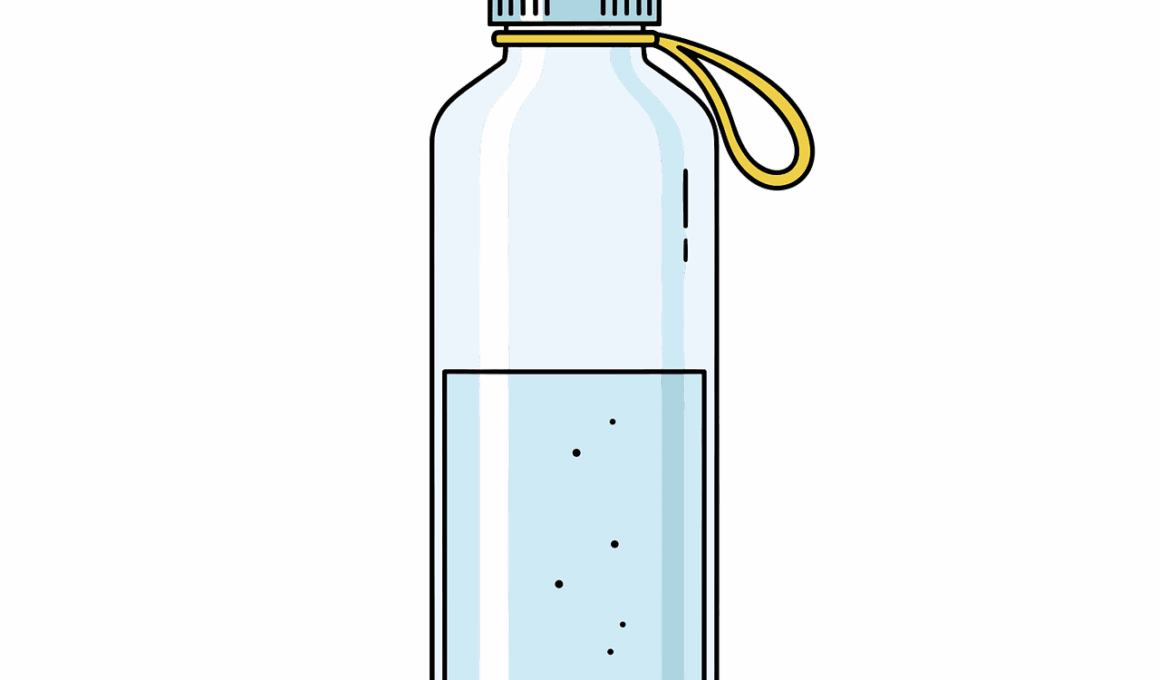Hydration and Nutrition Tips to Support Home-Based Rehabilitation
When engaging in a home exercise program aimed at rehabilitation, hydration is essential. Water plays a crucial role in muscle recovery, joint lubrication, and overall health. Ensure to maintain optimal hydration by drinking water regularly, especially before, during, and after exercise. Dehydration can impair physical performance, increase muscle fatigue, and hinder the healing process. Aim for at least eight glasses of water daily, adjusting based on activity levels. Individual needs may vary based on factors like weight, climate, and level of physical activity. Pay attention to signs of dehydration such as dry mouth, fatigue, or lightheadedness. In addition to water, consider incorporating hydrating foods into your diet, such as cucumbers, strawberries, and oranges. Consuming these can boost hydration levels while providing essential nutrients. Another great option is coconut water, known for its electrolytic content, helping replenish lost minerals. Always have water accessible during your rehabilitation exercises to remind you to hydrate. Also, establish a routine that incorporates hydration into your daily activities to support this aspect of your rehabilitation effectively.
Nutrition is equally as important as hydration when it comes to supporting effective rehabilitation. Consuming a balanced diet rich in vitamins and minerals is essential to promote healing and recovery. Focus on incorporating a variety of foods from all food groups, including lean proteins, whole grains, fruits, and vegetables. Protein is particularly critical for muscle repair; sources include chicken, fish, beans, and nuts. Carbohydrates are also vital as they provide energy for your workouts. Choose whole grains like brown rice and quinoa for sustained energy release. Incorporating healthy fats, including avocados and olive oil, can also help reduce inflammation, aiding recovery. Additionally, don’t forget to consume foods rich in antioxidants, like berries, to combat oxidative stress during rehabilitation. Consider meal prepping to ensure balanced meals are readily available, maintaining consistency in your nutritional intake. Keep snacks on hand such as yogurt, mixed nuts, or fruit for additional fuel between main meals. Pay attention to portion sizes to avoid overeating, which can lead to lethargy. Overall, focus on nurturing your body through proper nutrition to maximize the outcomes of your home rehabilitation exercises.
Supplements to Consider
While a balanced diet is the foundation of good nutrition, certain supplements may benefit your rehabilitation journey. Consulting with a healthcare professional before starting any new supplement regime is essential. Omega-3 fatty acids, found in fish oil, are known for their anti-inflammatory properties, making them beneficial in reducing soreness and swelling post-exercise. Similarly, glucosamine and chondroitin can support joint health, offering relief for individuals recovering from injuries or undergoing intense workout regimens. Vitamin D is critical for bone health and may enhance muscle function; ensure adequate levels through sun exposure or dietary sources like fortified foods. Magnesium is another important mineral that supports muscle function while reducing cramps and spasms. Creatine, commonly used for muscle building, may also enhance recovery times and improve overall performance in strength training exercises. Always follow recommended dosages and pair supplements with appropriate nutrition. Remember, supplements are not substitutes for a healthy diet but rather enhancements. Assess your dietary intake regularly, and adjust supplements according to your rehabilitation needs and overall health goals.
The timing of your meals and hydration can greatly impact your rehabilitation efforts. Pre- and post-workout nutrition is particularly crucial. Eating a light snack, rich in carbohydrates and some protein, about an hour before exercising can provide the necessary energy to perform optimally. Examples include whole-grain toast with peanut butter or a banana with yogurt. After your workout, prioritize refueling within 30-60 minutes to maximize recovery, helping to repair muscle tissue. Consider protein smoothies or wraps to replenish energy and nutrients promptly. Additionally, the timing of hydration plays a role in your performance and recovery. Drinking water before, during, and after the workout is vital to sustain hydration and aid in nutrient transportation. Set reminders or use a hydration app to help you keep track of your intake. Continuous hydration throughout the day enhances mental focus and physical performance as well, both critical when undergoing rehabilitation. Listening to your body should guide you in determining when to consume fluids and how much to hydrate, thus fostering a smoother rehabilitation journey.
Creating a Supportive Environment
Establishing a supportive environment is key for successful home-based rehabilitation. Factors such as accessibility to nutritious foods, a clean workout space, and motivational support go a long way. Ensure your kitchen is stocked with healthy ingredients, creating fewer barriers when preparing meals. Cook in bulk, and always have fruits and snacks available for convenience when needed. Designate a specific area in your home for exercising, ensuring it is free from distraction and clutter. This environment encourages you to focus on your rehabilitation goals. Placing workout equipment within reach can remind you to engage in daily exercises. Engaging family and friends can provide emotional support and accountability during your rehabilitation process. They can motivate you to stick with your exercise program and maintain healthy eating habits. Consider finding a workout buddy who can join you virtually or in person, making the process more enjoyable. Using technology, such as apps or fitness trackers, can help remind you of your goals and provide encouragement through tracking your progress. This well-rounded approach creates a more conducive atmosphere for successful rehabilitation.
It is essential to monitor the impact of hydration and nutrition on your rehabilitation process. Keeping a journal can significantly help track your food intake, hydration levels, and how they correlate with your energy levels and exercise performance. This conscious approach allows for adjustments to be made, enhancing what works and identifying areas needing improvement. Reflect on how different foods affect your recovery times and energy fluctuations, helping tailor your diet to your personal needs. Note any allergic reactions or sensitivities to specific foods, adjusting your menu accordingly to avoid setbacks. Consider sharing your findings with a healthcare or nutrition professional for guidance in refining your strategy. Additionally, remember to celebrate your progress to remain motivated. Recognizing the small milestones boosts morale and reinforces the positive behavior you are establishing. This comprehensive approach to monitoring creates a clear picture of how these elements contribute to your rehab journey. Incorporating photos of meals or workouts can also visually depict your progress over time, making any gains easier to recognize. Combining hydration, nutrition, and monitoring fosters a healing environment, allowing optimal rehabilitation.
Conclusion
In conclusion, hydration and nutrition are crucial elements in the success of home-based rehabilitation programs. Ensuring adequate water intake and consuming a balanced diet filled with essential nutrients elevate your recovery process. Implementing a structured dietary and hydration plan tailored to your individual needs will yield significant benefits. Additionally, the inclusion of supplements, meal timing, and creating a supportive environment are vital components contributing to your overall rehabilitation. Remember the importance of tracking progress through journals or apps for better accountability and adjustments. Also, sharing your journey with friends, family, or professionals can be quite encouraging. They can offer support when motivation dips or challenges arise. Always stay flexible in your approach to adapt to changing needs or circumstances throughout your rehabilitation journey. Ultimately, a holistic focus on both hydration and nutrition, alongside consistent physical activity, lays the groundwork for a successful rehabilitation experience. Transitioning into a healthier lifestyle not only supports recovery but also fosters long-term well-being. Commit to your journey with passion and resilience, and remember that your health is your greatest investment.
Engaging in a home exercise program and focusing on hydration and nutrition is a multifaceted process that yields substantial benefits for rehabilitation. For individuals recovering from injuries or surgeries, these two factors cannot be overlooked. A solid foundation built on proper hydration and nutrition can empower you, enhancing your overall physical and mental health. Investing time into understanding how these elements impact performance and recovery is crucial. As you progress in your rehabilitation, adapt your strategies to ensure they serve your goals effectively. In the end, the journey to recovery is personal and requires dedication and tenacity. By prioritizing your hydration and nutrition, maintaining motivation, and supporting your body through well-structured rehabilitation programs, you can achieve remarkable results. Small steps lead to significant changes; embrace the process with patience and resilience. Seek advice whenever needed and never hesitate to modify your approach according to personal preferences or feedback. Open communication with healthcare professionals can guide you throughout this journey. Stay committed and focus on nourishing yourself both physically and mentally, ensuring a smoother rehabilitation and a return to a healthier lifestyle.


